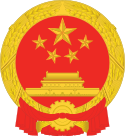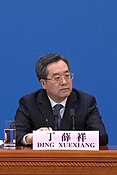Vice_Premier_of_the_People's_Republic_of_China
Vice Premier of the People's Republic of China
Senior official position in the government of China
The vice premiers of the State Council of the People's Republic of China are high-ranking officials under the premier and above the state councillors and ministers.[1] Generally, the title is held by multiple individuals at any given time, with each vice-premier holding a broad portfolio of responsibilities. The first vice-premier takes over duties of the premier at the time of the latter's incapacity. The incumbent vice premiers, in order of rank, are Ding Xuexiang, He Lifeng, Zhang Guoqing and Liu Guozhong.
The highest-ranked office holder is informally called the Senior Vice Premier or First Vice Premier (Chinese: 第一副总理) or Executive Vice Premier (Chinese: 常务副总理), a most prominent case being Deng Xiaoping in the mid-to-late 1970s.[2][3] In irregular instances, the position of a senior vice premier has been named either to indicate degree of power, nominal power, or when the premier is incapacitated and requires a full-time deputy to carry out his regular duties.




